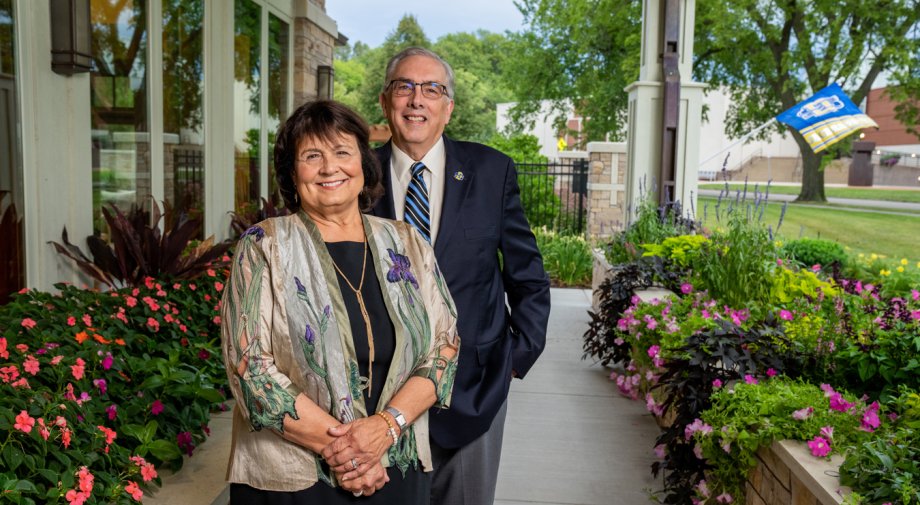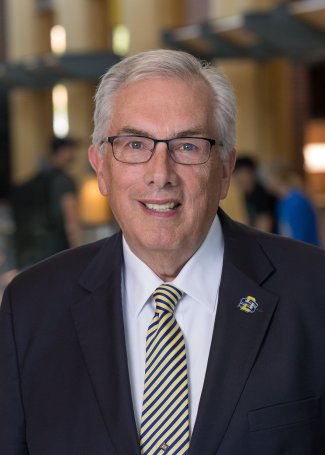
Barry H. Dunn was named the 20th president of South Dakota State University in April 2016, the fourth alumnus chosen to lead the institution. He assumed office May 23, 2016.
Dunn is an enrolled tribal member of the Sicangu Lakota and lived on the Rosebud Reservation in South Dakota for many years. He is believed to be the first enrolled member of a federally recognized tribe to serve as a president or chancellor of an 1862 land-grant university.
Throughout his time as president, Dunn has been instrumental in a number of key initiatives.
- Pathway to Premier, the university’s current seven-year strategic plan, that maintains the strategic direction for the institution initially established through Imagine 2023 and infuses a set of core values around people-centered leadership, creativity, integrity, diversity and excellence. Promoting the plan and living its core values are critical to fulfilling the SDSU’s vision of being a premier land-grant university. Pathway to Premier will also serve as the catalyst for the university to explore a move to R1 status, placing it among the most notable research universities in the nation.
- The Wokini Initiative is a program aimed to create greater access to higher education for Native Americans in South Dakota. Dunn launched the Wokini Initiative early in his presidency to increase programming and support to enrolled members of the state’s nine tribal nations while simultaneously enhancing collaborations and programs with tribes, tribal colleges and tribal organizations.
- SDSU Connect is an initiative to connect SDSU with the Sioux Falls metropolitan area to promote higher education at SDSU, strengthen relationships with industry leaders and serve workforce needs.
Accreditation
Through a successful HLC accreditation visit in fall 2019, SDSU received a 10-year reaffirmation of accreditation. This was the university’s most comprehensive institutional accreditation report and was the result of current and past leadership and a commitment to excellence across the university’s mission.
Individual program accreditations clearly contributed to the strength of the university’s overall report. Under Dunn’s presidency, there has been continuous growth in accredited and certified programs reaching an all-time high of 60 accredited programs.
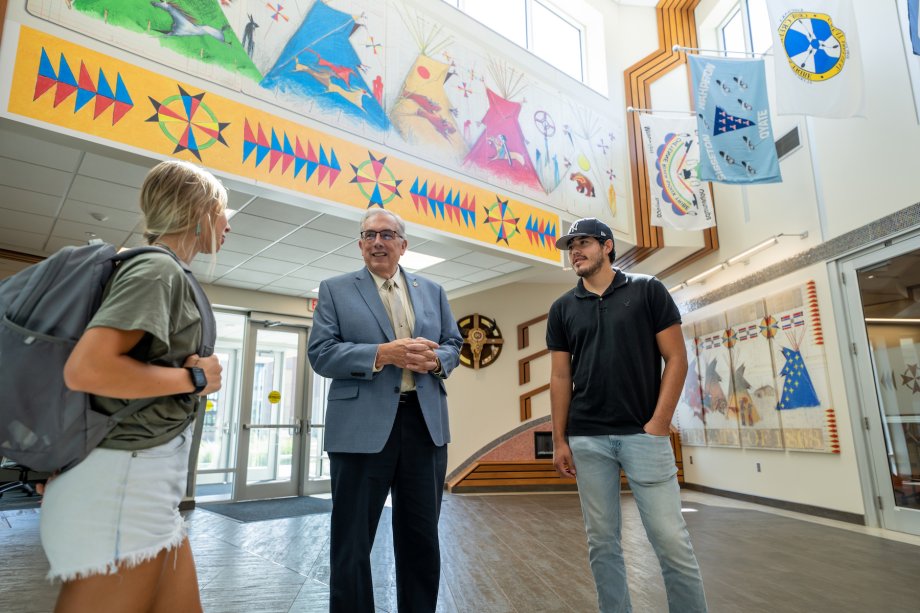
Wokini Initiative
During President Dunn’s inaugural address, he committed South Dakota State University to better serve the Indigenous people of South Dakota. His vision became the Wokini Initiative, the university’s strategic plan to serve South Dakota’s tribal members by improving their access to the benefits of higher education. Dunn’s Wokini Initiative has piloted the way, in South Dakota and across our nation, in driving institutional change.
In his conversations with tribal and campus leaders, five strategies emerged:
- Increase collaboration and partnerships with tribes and tribal organizations;
- Provide a sustainable flow of financial resources;
- Increase the American Indian student population on campus to mirror their population in the state with enhanced recruiting and provide large renewable scholarships;
- Improve Indigenous student success to levels to match the student body’s by enhancing cultural programming and instituting proven student success activities; and
- Build a new American Indian Student Center in the heart of campus.
To accomplish these goals, Dunn created a sustainable revenue stream by pledging SDSU’s annual revenue from its historic land-grant land to support the Wokini Initiative. As part of the 1887 Dawes Act, the federal government claimed and assigned 160,000 acres to South Dakota to support its new land-grant college and agricultural experiment station. Through providing the annual resources generated by the land, Dunn is returning the benefit to the heirs from whom the land was taken.
Funding for the Wokini Initiative has come through private donations to the SDSU Foundation and revenue generated by land as part of the South Dakota Permanent Trust Fund. Dunn also leveraged those resources to raise over $25 million in philanthropic gifts. With Dunn’s advocacy, the U.S. Congress, with strong bipartisan support, created The New Beginning for Tribal Students grant program as part of the 2018 Farm Bill and appropriated $5 million to it annually.
Through the help of a tribal advisory council, SDSU established a clear communication pathway to the tribes and tribal leaders. With nearly $1 million of annual earmarked resources, SDSU has hired American Indian faculty and staff, increased recruiting of tribal members, improved student advising and counseling, developed culturally relevant programs, and improved its American Indian Studies program.
Today, enrollment is growing, freshman retention has soared, and American Indian students are succeeding in a wide array of academic programs. The Wokini Initiative is thriving on a sound foundation with the newly built American Indian Student Center in the heart of campus, endowed staff positions and an endowed scholarship fund of nearly $20 million.
Generous donors have supported key initiatives, including more than $9.8 million in endowments and a $4 million lead gift for the new American Indian Student Center that completed construction in May 2020. Altogether, more than $17.6 million has been raised for the Wokini Initiative under Dunn’s leadership. Additionally, the Wokini Initiative received grants from the Bush Foundation and the Margaret A. Cargill Philanthropy.
Working with congressional leadership in Washington, D.C., Dunn and SDSU leadership led efforts to include the authorization of $5 million per year for the New Beginning for Tribal Students initiative in the 2018 U.S. Farm Bill to provide grants, on a matching basis, for land-grant institutions.
In January 2020 the president of the United States signed an Ag Appropriations Bill with a historic provision that provides yearly funding opportunities up to $500,000 per state. The funding supports American Indian students seeking the benefits of higher education at land-grant universities, which include tribal colleges across the nation.
A signature moment for Dunn came in November 2019 when he was selected to deliver the William H. Hatch Memorial Lecture during the annual meeting of the Association of Public Land-grant Universities. The lecture is one of three rotating lectures presented by the National Institute of Food and Agriculture and the APLU, which honor three historic land-grant university figures: Justin Smith Morrill, William Henry Hatch and Seaman A. Knapp. The lecture commemorates the foresight of Hatch in leading the movement to establish national support for agricultural science at land-grant universities. Dunn’s lecture, “Wokini – A Morrill Obligation to Create a New Beginning,” focused on SDSU’s Wokini Initiative.
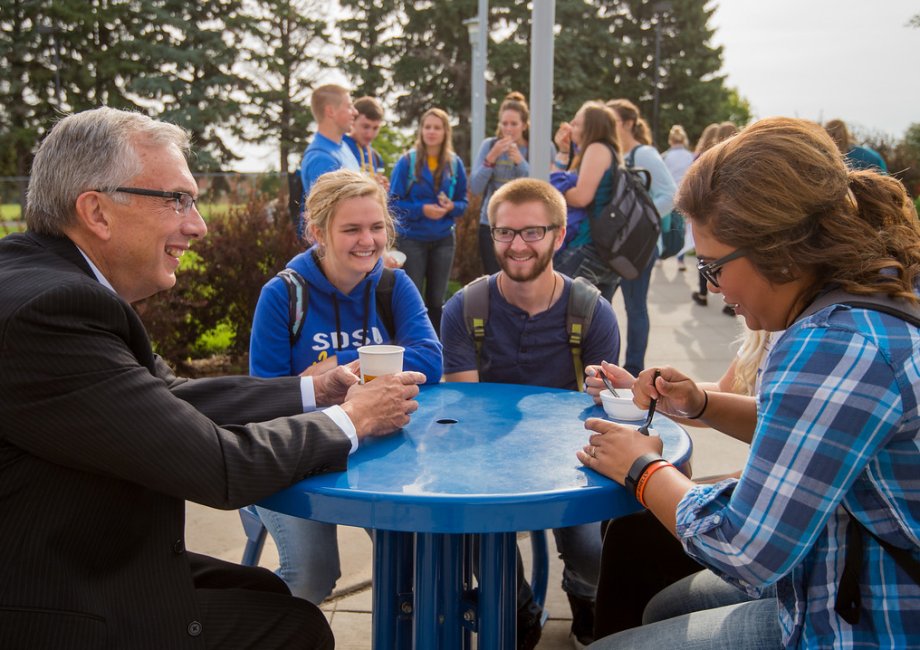
Student Success
Imagine 2023 set a goal of freshman to sophomore retention of 80%. Under Dunn’s leadership, SDSU posted a record retention of 81% in 2020, followed by an 80% retention the following year. The previous record for retention was 78.6% set in 2015. Since the launch of Imagine 2023, SDSU’s average retention has been 79.5%.
SDSU also continues its upward trend in graduate numbers with 2,529 degrees conferred in May 2022, following a 2021 commencement with 2,440 degrees awarded. SDSU has a five-year average of 2,619 degrees awarded, more than 400 more degrees that the next largest university in South Dakota.
During that five-year period, the university awarded the most nursing degrees in the state and ranked ahead of all other South Dakota universities for degrees in biological and biomedical sciences, human sciences, and degrees in the liberal arts and humanities. Additionally, SDSU awarded more than 1,000 engineering degrees.
The Wintrode Student Success and Opportunity Center, launched by Dunn in January 2022, plays a critical role in student success. The center is home to tutoring, first-year advising, the academic success and recovery program and the student success NETwork. NETwork partners include the American Indian Student Center, Continuing and Distance Education, Disability Services, the Graduate School, Van D. and Barbara B. Fishback Honors College, the Office of International Affairs, Multicultural Affairs, New Student Orientation and Residential Life.
New Facilities
In addition to the American Indian Student Center, Dunn’s leadership has led to many other major facility projects.
In 2017, the South Dakota Legislature approved a $58 million project for the Animal Disease Research and Diagnostic Laboratory that included an addition to the current structure and a Biosafety Level-3 space, the only level-3 security facility in the state.
Dunn was also instrumental in gaining approval for the $55 million Raven Precision Agriculture Center that opened in summer 2021. He led efforts to secure $22 million from the South Dakota Legislature and a lead naming-rights gift of $5 million from Raven Industries. SDSU is the first and only university in the nation to offer a Bachelor of Science degree precision agriculture.
The Oscar Larson Performing Arts Center received a $49.8 million expansion, making it the most robust performing arts center in the region. The expansion included a new recital hall, proscenium theater, offices and practice areas.
Harding Hall, home of the Ness School of Management and Economics, underwent a $7.5 million renovation to include new classrooms, office spaces and support areas, giving SDSU a home for its business economics and associated degrees.
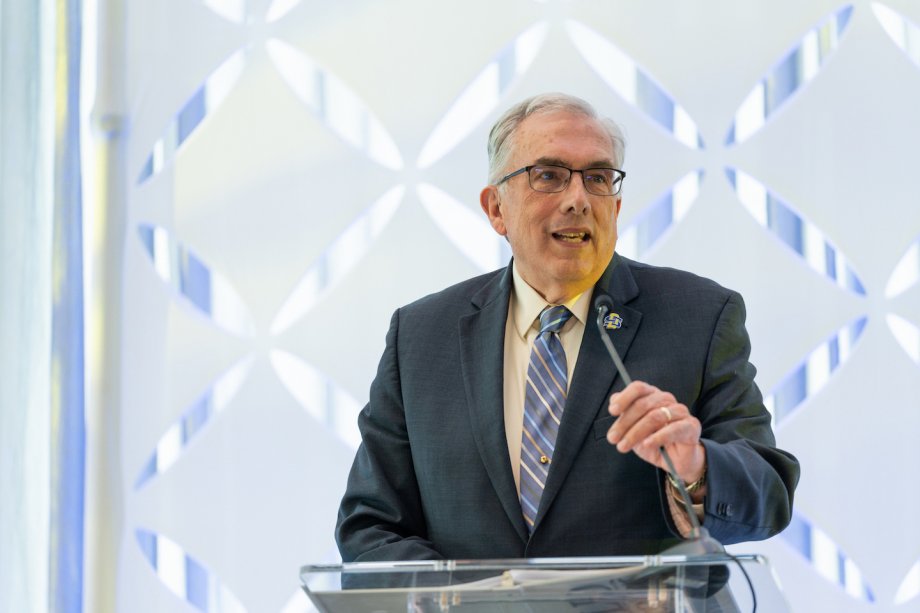
Current Projects
The Frank J. Kurtenbach Family Wrestling Facility is the result of a lead gift by former SDSU wrestler and coach Frank Kurtenbach. This facility will serve as a dedicated practice space and is expected to be completed in December 2022.
Construction began on First Bank & Trust Arena in summer 2022. With a generous $20 million lead gift from First Bank & Trust to renovate the formerly known Frost Arena, this will be a game-changing facility for players, coaches, students, community members and fans. First Bank & Trust Arena is anticipated to be completed in December 2024.
The first and second floors of Berg Agricultural Hall are currently under renovation of to update infrastructure such as HVAC, fire suppression and lighting systems. The renovation is expected to reach completion in March 2023.
Lincoln Hall is under renovation to update lighting, HVAC, plumbing and other mechanical work throughout the building. This building will be the new home to the School of American and Global Studies and the administrative offices of the College of Arts, Humanities and Social Sciences. The expected completion date is March 2023.
Fundraising
In October 2021, the South Dakota State University Foundation made the announcement of the Bold & Blue campaign. With a goal of raising half a billion dollars to support SDSU, Bold & Blue is the largest, most impactful and transformative initiative in our state’s history. This campaign is about the future of SDSU—it’s about investing in our people, our places, our traditions and our innovations to elevate every corner of the university. Awards and Citations Throughout Dunn’s presidency, he has received many awards and served on a number of boards.
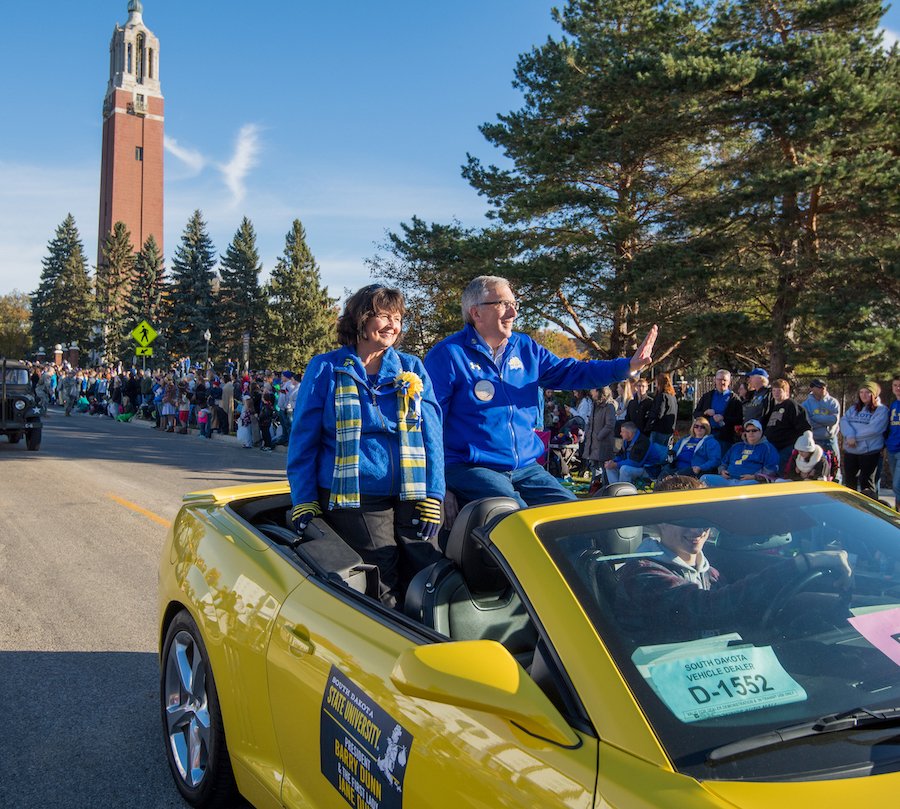
Background
Dunn’s time at SDSU dates to the mid-1970s when he received a bachelor’s degree in biology at SDSU and subsequently completed two graduate degrees in animal science—a master’s in 1977 and a Ph.D. in in 2000. He became the South Dakota Corn Utilization Council Endowed Dean of the College of Agriculture and Biological Sciences in 2010. He also served as director of SDSU Extension and as a professor of animal science.
As dean, Dunn led a college with approximately 550 faculty and staff, 2,800 graduate and undergraduate students, and a $78 million annual budget, including more than $20 million in grant and contract awards, fundraising and development. He shaped the academic and strategic direction of eight departments, spanning 18 degree programs, one regional research and outreach center, six research field stations and 14,500 acres of Agricultural Experiment Station research land.
As SDSU Extension director, Dunn administered and set the vision for five program areas across two colleges and nine departments, as well as eight regional Extension centers with a $12 million annual budget. He led a team of approximately 150 faculty and staff members and 3,500 adult volunteers.
Dunn spent six years at Texas A&M University-Kingsville (from 2004 to 2010) as executive director of the King Ranch Institute for Range Management. He worked in Brookings as an Extension livestock specialist and as an assistant professor in SDSU’s Department of Animal and Range Science from 1997 to 2004.
From 1979 to 1996, Dunn was a successful rancher, managing his family’s cattle ranch in Mission, South Dakota. In 2015, he was appointed to the South Dakota Habitat Conservation Fund by Gov. Dennis Daugaard, and to the Governor’s Pheasant Work Group in 2014. He served as an ex-officio member of the ag advisory board for the First Dakota National Bank in Yankton, South Dakota, from 2011 to 2016, and was a member of the board of directors for Padlock Ranch in Dayton, Wyoming, from 2009 to 2017.
Dunn has a rich academic background, was a successful rancher and farm operator and is a published author and researcher. He is a nationally recognized expert in beef production and ranching systems, and is a member of several professional organizations, including the Society for Range Management and the American Society of Animal Science. He has a deep historical and cultural knowledge of South Dakota and South Dakota State University, and strong, statewide relationships with industry influencers and stakeholders, including government officials, business leaders, university administration, faculty and staff.
Dunn and his wife, Jane, maintain her family’s original homestead north of Brookings where they raised their two sons.
